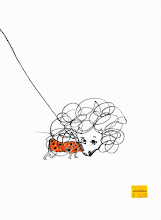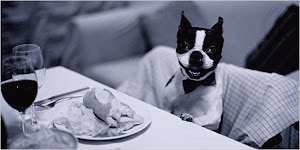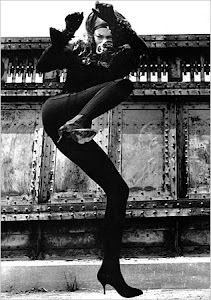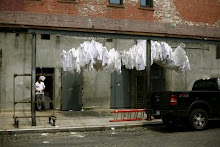
I didn't think growing up had much to say for itself except that one day we knew it would be over. As a sad kid I always projected myself into the Future, where things would be better (they could not be worse) and I lived more happily in this fantasy world than in the real one.
Lately though I've been drawn to books either intended for young people intent on growing up (it does seem to be a choice nowadays) or about young people trying to grow up, and the latest in this reading series has been Black Swan Green by David Mitchell, touted as being the "British Catcher in the Rye." Always beware of these sorts of references. They are never true and frankly do a disservice to both books.
Leaving that pet peeve aside, this is a good book. In it we have 13-year old Jason Taylor who lives in a sleepy village called Black Swan Green where there are no black swans or swans of any colour. Jason stammers, different from stuttering, which makes speaking a high-pressure situation. Imagine having to dodge words fast enough not to give away the fact you are dodging them; imagine not being able to rely on your very self to speak your very own mind.
For a number of reasons central to who he is Jason is set upon by bullies. I liked this part very much, having lived in a few sleepy places myself. Those who live in big cities, I've noticed, talk about the pastoral pleasures of small town life and in my experience small towns are more venal and vicious than a city in that word spreads faster and you can't get away from it, there are no other circles for you to live in.
Behind this drama is another one. Unbeknownst to Jason, because he is young, and obvious to us, his parents' marriage is disintegrating. What is also clear to us but not to Jason, his dad is hanging by a thread at work. This is nicely played in the book, a champion bit of writing in that Jason pays no never mind to the signs and we can't miss them. See, we did learn a few things along the way after all.
Jason is bullied mercilessly and frankly, not being overly astute politically myself, I could see no way out of it. But all of a sudden Jason grows up, grows into himself, takes on the bullies in his own way, tells the truth, tells lots of truths and suddenly, simply by standing up for that very thing, the truth, the sting is gone. Bullies slayed. The crippling fears he has felt disappear. All in the power of a small action and a few clear words.
Jason grows up, in other words, and it happens all of a sudden as it probably does in life. Is that how it is? One day we are children and then another day, all of a piece, we are not? I liken this to the stomach flu, my best definition for utterly defined and impermeable states of being -- in illness we cannot actually imagine ever feeling well; healthy, we cannot imagine the feeling of sick.
And while Jason has been as benignly indifferent to his parents as they are to him (well, except for the fear of punishment thing) and despite the fact his father seems a prat, the fact his family is shattered is a change he finds hard to take. Naturally. His father has nearly bankrupted his family to look after another woman which believe you me is the talk of the town in good old Black Swan Green, but life is not so stark. As it turns out, the woman is a childhood friend, far more plain and speaking less "posh" than Mum but nonetheless the one dad prefers (to be brutal about it) or the one that fits him better. The father, now that his own truth is out, is softer, kinder, more human.
Leaving his home for the last time, the home that is no longer his in any way, Jason fights tears -- after all, he's a man now and nearly 14. "It'll be all right," his older sister says. "In the end, Jace."
"It doesn't feel very all right."
"That's because it's not the end."
So there you go. As far from childhood as we may be, there's still something to learn. If it still hurts, it's not yet the end.
Lately though I've been drawn to books either intended for young people intent on growing up (it does seem to be a choice nowadays) or about young people trying to grow up, and the latest in this reading series has been Black Swan Green by David Mitchell, touted as being the "British Catcher in the Rye." Always beware of these sorts of references. They are never true and frankly do a disservice to both books.
Leaving that pet peeve aside, this is a good book. In it we have 13-year old Jason Taylor who lives in a sleepy village called Black Swan Green where there are no black swans or swans of any colour. Jason stammers, different from stuttering, which makes speaking a high-pressure situation. Imagine having to dodge words fast enough not to give away the fact you are dodging them; imagine not being able to rely on your very self to speak your very own mind.
For a number of reasons central to who he is Jason is set upon by bullies. I liked this part very much, having lived in a few sleepy places myself. Those who live in big cities, I've noticed, talk about the pastoral pleasures of small town life and in my experience small towns are more venal and vicious than a city in that word spreads faster and you can't get away from it, there are no other circles for you to live in.
Behind this drama is another one. Unbeknownst to Jason, because he is young, and obvious to us, his parents' marriage is disintegrating. What is also clear to us but not to Jason, his dad is hanging by a thread at work. This is nicely played in the book, a champion bit of writing in that Jason pays no never mind to the signs and we can't miss them. See, we did learn a few things along the way after all.
Jason is bullied mercilessly and frankly, not being overly astute politically myself, I could see no way out of it. But all of a sudden Jason grows up, grows into himself, takes on the bullies in his own way, tells the truth, tells lots of truths and suddenly, simply by standing up for that very thing, the truth, the sting is gone. Bullies slayed. The crippling fears he has felt disappear. All in the power of a small action and a few clear words.
Jason grows up, in other words, and it happens all of a sudden as it probably does in life. Is that how it is? One day we are children and then another day, all of a piece, we are not? I liken this to the stomach flu, my best definition for utterly defined and impermeable states of being -- in illness we cannot actually imagine ever feeling well; healthy, we cannot imagine the feeling of sick.
And while Jason has been as benignly indifferent to his parents as they are to him (well, except for the fear of punishment thing) and despite the fact his father seems a prat, the fact his family is shattered is a change he finds hard to take. Naturally. His father has nearly bankrupted his family to look after another woman which believe you me is the talk of the town in good old Black Swan Green, but life is not so stark. As it turns out, the woman is a childhood friend, far more plain and speaking less "posh" than Mum but nonetheless the one dad prefers (to be brutal about it) or the one that fits him better. The father, now that his own truth is out, is softer, kinder, more human.
Leaving his home for the last time, the home that is no longer his in any way, Jason fights tears -- after all, he's a man now and nearly 14. "It'll be all right," his older sister says. "In the end, Jace."
"It doesn't feel very all right."
"That's because it's not the end."
So there you go. As far from childhood as we may be, there's still something to learn. If it still hurts, it's not yet the end.












1 comment:
For a number of reasons I spent most of my childhood inside my head. I felt more at home in this fantasy world which, for me, was more real than the so-called real one. Its enduring effect though has meant that when I experience something or someplace for the first time I cannot hep but think, "Is that it?" When I went to New York and London the first time I actually said that. My imagined NY and London were so much better. Peggy Lee, eat your heart out.
Post a Comment